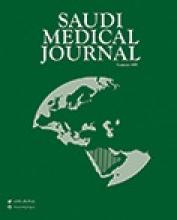Abstract
OBJECTIVE: To determine the level of gynecological morbidities and other related morbidities; and to examine the effect of women empowerment on the reproductive tract infections among currently married Omani women.
METHODS: This study is a part of the National Health Survey in the Sultanate of Oman, conducted between January and March 2000. The total number of households selected was 1968 with a total of 2037 ever-married women aged 15-49 years, of them 1662 were eligible to complete the gynecological morbidity symptoms questionnaire and to be clinically examined for gynecological morbidities.
RESULTS: Despite the free facilities provided, one in every 4 women had reproductive tract infection and nearly half of the women suffer from at least one kind of gynecological disease. The prevalence of any sexually transmitted diseases was 4%, approximately 10% had combined genital prolapsed and 27% had cervical ectopy. Older women, education, work status, urban residence, heads of households, high economic status, and took their own decision about going to hospital, are significantly more empowered.
CONCLUSION: Gynecological morbidity is highly prevalent among ever-married women. The contribution of the sexually transmitted diseases to the high prevalence of reproductive tract infection appears to be modest. Genital prolapse was one of the risk factors for reproductive tract infection, education as a proxy for women empowerment was a poor predictor for the occurrence of the diseases.
- Copyright: © Saudi Medical Journal
This is an open-access article distributed under the terms of the Creative Commons Attribution-Noncommercial-Share Alike 3.0 Unported, which permits unrestricted use, distribution, and reproduction in any medium, provided the original work is properly cited.






